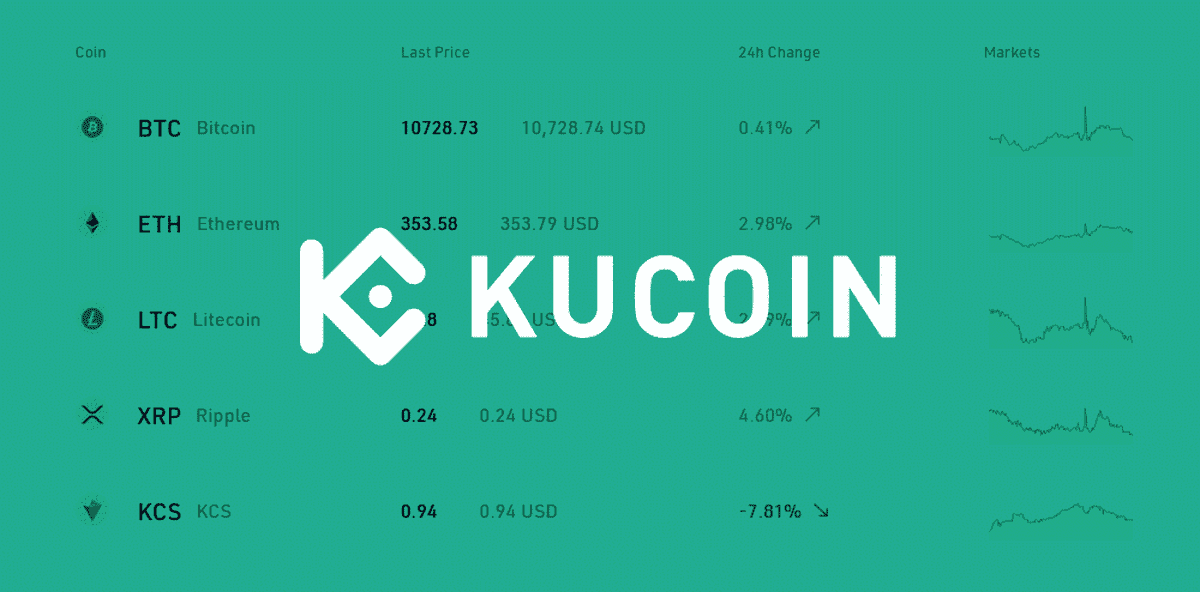KuCoin is a cryptocurrency exchange that can be used to buy and sell Bitcoin, Ethereum, Litecoin, TRON, USDT, NEO, XRP, KCS and more. It was created in 2017 by an experienced team of crypto experts. Unlike other exchanges with millions of users (like Binance), KuCoin has only around 3 million registered users as of December 2018.
This is advantageous for you because it means less competition when trading on KuCoin. This will give you access to better prices than what would be available on larger exchanges like Binance or Coinbase Pro.
In this article, we will provide an overview of what KuCoin is and how you can use it to buy cryptocurrency.
Want to try KuCoin? Click here to register for free!
What is KuCoin?
KuCoin is a cryptocurrency exchange based in Hong Kong. It was created by an experienced team of crypto experts and technologists who had previously worked for major financial institutions like Ant Financial, Tencent, Morgan Stanley, etc.
It’s important to note that KuCoins are not owned by any single person or entity; they’re distributed among the users of the platform.
KuCoin is a cryptocurrency only exchange, so you cannot trade crypto-to-crypto on it. It currently supports 121 trading pairs with an exclusive token known as KuCoin Shares (KCS).
How to use Kucoin?
Registering and using KuCoin are very straightforward thanks to their simple registration process.
The registration process at KuCoin is super easy and takes only a few minutes. All you need to do is enter your email address, create an account using either Facebook or Google+, confirm it via the link they send over email, provide your phone number for two-factor authentication and set up a password of your choice. That’s about as straightforward as it gets!
How can I purchase cryptocurrency using KuCoin?
To buy crypto on the KuCoin platform you need to first create a KuCoin account and then deposit funds into your account before trading so transactions cannot be reversed. The available cryptocurrencies are Bitcoin (BTC), Ethereum (ETH), Litecoin (LTC), TRON (TRX) and USDT.
How to Buy Bitcoin with KuCoin?
It’s a very simple process of buying cryptocurrency on the platform. The first thing you need to do is deposit funds into your account. This can be done by clicking ‘Deposit’ from the main menu and then selecting either ETH (Ethereum) or BTC (Bitcoin). Currently, KuCoin does not accept deposit via credit card or PayPal. According to KuCoin support, the company is considering opening up more payment gateways in the future.
Once you have deposited your funds, navigate to the ‘Markets’ tab on KuCoin and search for the cryptocurrency that you wish to buy. If an exchange is available with favorable prices (meaning the price of bitcoin in USD has gone up), then it’ll show at a green light at the top of that section. You can then click on ‘Buy ETH’ or ‘Buy BTC,’ and you’ll be asked to enter your desired quantity (you can purchase any amount up to your total balance).
Once confirmed, KuCoin will show a confirmation message with the updated price information for Bitcoin in USD. If you are unsure about how much bitcoin you have to purchase, there is a ‘Balance’ link on the top of KuCoin that will show your total available balance.
In order to deposit fiat currency, you must go through an account verification process with ID and proof of address. Be sure to read all instructions before submitting any information – this ensures that the required documents are submitted and that you are not putting in any information twice.
If all goes well, KuCoin will show confirmation with your account number and a link to where the funds were sent. You can then click on ‘Balances’ at the top of KuCoin to view your balances for various cryptocurrencies.”
Looking for no deposit bonus? Click here: https://top-canadiancasinos.com/no-deposit-bonus/
How to Buy Ethereum with KuCoin?
Currently, you can only buy Ethereum with Bitcoin, which you cannot purchase directly on KuCoin. It will take a few minutes to get your Bitcoin wallet verified and then transfer it from Coinbase or another exchange that allows trading in fiat currencies (i.e., USD). You are not limited by the number of Bitcoins you can trade for ETH so do make sure to purchase enough that the transfer, trading fees, and withdrawal of your Ethereum will not eat into your profits.
Is KuCoin exchange safe?
KuCoin is a very secure cryptocurrency exchange, and it’s the most advanced one in terms of security. KuCoin takes its role as an educator seriously by providing detailed articles on various cryptocurrencies such as different Bitcoin wallets or what forks are for.
Kucoin employs a multi-layered system that includes strict capital controls, wallets built around the world’s leading hardware security standards and multiple levels of protection against potential cyber risks.
What makes KuCoin exchange different from others?
There are many reasons why people use Kucoin over other exchanges. First, KuCoin holds your tokens in a wallet for you so that they are not being held on the exchange itself and vulnerable to hackers. In terms of cryptocurrency wallet security, the security of your funds are protected because they don’t actually exist on the site itself; instead, they’re stored on the blockchain.
Second, it provides trading pairs with most of the popular cryptocurrencies (ETH/BTC) but also has interesting coins like NEO and TRON available.
Third, its system is more robust than other exchanges because it can handle multiple trades at the same time.
Lastly, KuCoin has what is called a Referral Program that pays you for inviting new customers to their website.
Can US use KuCoin?
You can use KuCoin from any country.
Can I use KuCoin in China?
Currently, KuCoin is not available for use in China.
What is KuCoin withdrawal fees?
KuCoin doesn’t charge any withdrawal fees.
What is the Kucoin referral program?
The Referral Program rewards you with a percentage of trading fee generated by people invited to trade on the platform, if they sign up using your invitation code and make their first purchase of KCS (their own or somebody else’s). The amount will be displayed in the “Invitation Rewards” field.
Can I withdraw from KuCoin?
KuCoin allows you to withdraw your coins as long as you fulfil the security requirements for withdrawal.
Are there any withdrawal limits on Kucoin?
No, the platform does not have any restrictions in place for withdrawals at this time.
What are KCS coin values?
KCS is a cryptocurrency and it has its own trade value. It can be bought or sold with Bitcoin (BTC) or Ethereum (ETH).
How are KuCoins stored?
KuCoin uses a cold wallet, which is an offline storage for cryptocurrencies. The private keys to your wallets cannot be accessed online and the system never sends data you input directly from one of your devices to another device on their servers.
Can I sell KCS coins?
KCS coins are never sold. They can only be used to pay transaction fees on the KuCoin platform and buying other cryptocurrencies.
Do I need a KCS wallet?
Yes, you will have your own unique private key assigned that is stored in a digital wallet for all of the currencies bought or traded on the KuCoin exchange. The KCS wallet is a separate and unique digital storage from the wallets for other cryptocurrencies.
What are KuCoin Shares (KCS)?
KuCoin shares represent one of the most stable cryptocurrency investments in 2018, with its price at $0.257 as of December 13th, 2018. It provides daily dividends to investors who hold K currencies through two different pools.
KuCoin Shares (KCS) is a cryptocurrency issued by Kucoin, and it can also be seen as the “gas” of the exchange. The total supply of KCS coins on November 25th was 215 million units which were distributed to owners proportionally to their holdings in BTCs or ETHs at that time, depending on what they chose.
All the transactions of KCS coins are recorded in real time on a public blockchain to ensure transparency, and all trading fees earned by Kucoin exchange will be paid through these dividends.
KCS holders can collect their daily dividend from one of two sources:
– The “KuCoin Bonus” is calculated at 0.12% on the total trading volume of all currencies traded on KuCoin.
– The “Basic Income” is calculated at 12%, and it will be paid out in KCS tokens to ensure liquidity for users who trade with large quantities of coins every day.
KCS holders also have an opportunity to collect a daily bonus by holding onto their KCS coins.
Has KuCoin been hacked?
KuCoin has had no hacking incidents.
Phishing is an occurrence commonly seen on the internet where people are promoting fake versions of a website in order to steal your account information and login credentials. Visit this page for more information about phishing: https://www.kucoin.com/news/phishing-warning/.
Is KuCoin better than Binance?
KuCoin has many advantages over Binance such as lower trading fees, more cryptocurrency listings, and the ability to use KuCoin’s coin KCS.
For those who have never used KuCoins before, check out these steps:
– Register on their website at kucoin.com
– Input your email address and password
– Verify your email (check the spam folder)
– Once verified, click on “Verify Account” and input an address that you control like a personal ERC20 wallet or other cryptocurrency exchange account. This is to prove ownership of funds before trading so transactions can’t be reversed.
Is KuCoin better than CoinBase?
KuCoin is a newer cryptocurrency exchange that has many benefits over CoinBase. Some advantages of Kucoin are lower withdrawal fees, more trading pairs, and the ability to trade using their own coin KCS.
How can I withdraw money from KuCoin to my bank account?
KuCoin does not provide a direct bank transfer option. However, there are other cryptocurrency exchanges that offer this service such as Coinbase and Gemini. You can use your Bitcoin or Ethereum to buy USDT on those exchanges then withdraw it from the exchange where you bought it to your US bank account at one of these supported banks: Chase Bank, Wells Fargo, Bank of America, Citibank or USAA.
Does KuCoin support BEP20?
KuCoin offers a vast amount of trading pairs for its users. It has many different types of cryptocurrencies such as BTC, ETH, NEO and TRX. Users can also trade with KCS which is Kucoin’s own coin that gives the user bonuses on trading fees and other rewards like discounts in their affiliated stores or donations to charity organizations.
How long is KuCoin withdrawal?
KuCoin will process your withdrawal in 30-60 minutes. It depends on the blockchain as to when the assets will finally be transferred to your wallet. To enhance the security of your assets, if your withdrawal amount is larger than a certain amount, KuCoin has to manually process your transaction in 4-8 hours.
Can I withdraw from KuCoin without KYC?
KuCoin does not provide a withdrawal service for any account without KYC.
Do you need to verify your KuCoin account with ID?
To trade on the exchange, yes, users do have to pass level one of verification which is called “basic identity confirmation.” This involves providing basic information such as name and email address in order to withdraw funds.
Does KuCoin have Android and iOS apps?
The KuCoin app is available on Android and iOS devices, so you can trade Bitcoin, Ethereum or altcoins anywhere at any time. It also provides a desktop (Windows/MacOS) version which has better performance than the website’s web interface because it will sync with the data in your browser to provide an up-to-date monitor.
KuCoin has a referral bonus program where you get 20% of your friend’s trading fees as commission for life, and up to 12 % when there are bonuses available in the system!
How does security work at KuCoin?
The exchange is an efficient trade engine with multi-tiered levels of security from a variety of different wallets to keep digital assets safe.
How to create an account with KuCoin?
Register an account with KuCoin by supplying name, email address and a password.
Create the username of your choice, which will be displayed to others on the platform when you make trades or interact with other users in any way.
Select from several languages for trading preferences like English (default), Chinese, Korean and Vietnamese.
Remember that you are responsible for safeguarding your account, assets and password.
When you first create an account with KuCoin, the system will send a confirmation email to verify that you’re not a robot or automated program – this is known as CAPTCHA verification.
Select two-factor authentication (twoFA) when prompted during registration so that each login must be authorized with a code from your mobile device in addition to the password for logging into KuCoin.
You can also withdraw funds from an exchange directly if you have enabled 2FA on KuCoin and not been logged out of it, by selecting “Withdraw” then entering the withdrawal address and amount to send or swipe right (Android) or left (iOS) to complete the transaction.
Summary: Should I use KuCoin for cryptocurrency trading?
Yes, you should use KuCoin for cryptocurrency trading. It has one of the lowest fee rates in the industry and is a secure platform to trade on with advanced features like two-factor authentication only used by three exchanges worldwide. They also have over 50 crypto assets available which will grow as they continue adding more coins that are high volume movers.
If you are looking for the best cryptocurrency exchange, then KuCoin is it. You will not regret your decision should you decide to sign up and trade on this security-focused crypto trading platform.
Start using KuCoin right now. And it’s absolutely free too!





